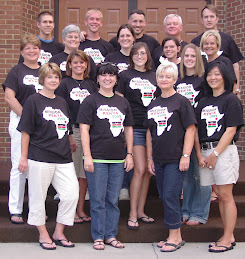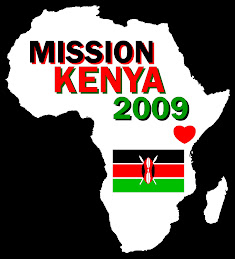 It seems so unreal – that we were in Kenya and now that we are back. What a small world this really is! Our time in Kenya went by very quickly. There is drastic difference between Nairobi, Gatab, and Eastman – WOW!
It seems so unreal – that we were in Kenya and now that we are back. What a small world this really is! Our time in Kenya went by very quickly. There is drastic difference between Nairobi, Gatab, and Eastman – WOW!Thank you to Pastor Wambua and his team of nationals that assisted us. Thank you to Principal Moses and his staff at the
 Youth Center. Thank you to Daryl and Luke for the preparation and leadership in organizing this trip. Thank you to all the team members and their help. We had a great team. Everyone worked well together. Everyone did well at exercising their flexibility. :o) Asante asana ya’ll!
Youth Center. Thank you to Daryl and Luke for the preparation and leadership in organizing this trip. Thank you to all the team members and their help. We had a great team. Everyone worked well together. Everyone did well at exercising their flexibility. :o) Asante asana ya’ll!It is hard to put into words the things we saw and the smells we smelled. Words cannot accurately describe these. Pictures can help, but still do not totally do it either. I did not hear people complain about the things they lacked or their circumstances.
 The children were precious. At the youth center, where we did VBS, they were excited to have us there. As we would drive up, we could hear the children cheer. Each day as we would leave, questions came about if we would be back the next day and the day after that.
The children were precious. At the youth center, where we did VBS, they were excited to have us there. As we would drive up, we could hear the children cheer. Each day as we would leave, questions came about if we would be back the next day and the day after that.I will miss the sing-song phrase of the children as we drove up the dusty, rocky roads to the church or to the school yelling out “How are you?” and waving as we went by each day.
 At the crusade location, our vans would be swarmed by the children as we drove in. Some of us had “Crusade buddies”. These children would find us each night and hold our hands or hang with us. My Crusade buddy would nudge my hand for the motion of what we were supposed to be doing to the lively worship song. :o) She was precious. Just after dark, she would wave goodbye and disappear (walk home). It was not uncommon for several children to be “sharing” our fingers as they held our hands.
At the crusade location, our vans would be swarmed by the children as we drove in. Some of us had “Crusade buddies”. These children would find us each night and hold our hands or hang with us. My Crusade buddy would nudge my hand for the motion of what we were supposed to be doing to the lively worship song. :o) She was precious. Just after dark, she would wave goodbye and disappear (walk home). It was not uncommon for several children to be “sharing” our fingers as they held our hands.The orphanage we visited is primarily for HIV babies. They have additional houses for school-age children as well. The babies are
 treated by doctors and given very good care. We saw some pictures on a bulletin board of when babies first arrived and how much growth and improvement occurred in 2 to 4 weeks of them being in the house. Each child has a volunteer that comes daily to help care for him/her. This volunteer gets the child dressed and feeds them. They play and spend time together. What a program!
treated by doctors and given very good care. We saw some pictures on a bulletin board of when babies first arrived and how much growth and improvement occurred in 2 to 4 weeks of them being in the house. Each child has a volunteer that comes daily to help care for him/her. This volunteer gets the child dressed and feeds them. They play and spend time together. What a program!Daily life is not simple. The many conveniences we take for granted are not necessarily available there. Like Mr. Zack mentioned, I am thankful for showers … maybe more thankful that others got showers finally. HAHA
The youth center was without electricity while we were there. Yet, they function as if this is normal. In Gatab, electricity is not a given, unless a generator is running. We learned that water is not a given.
 Public school class sizes are about 100 students per class with one teacher; this is throughout the country. At the youth center, the class size average was 30. For VBS most of our classes were combined, making classes 60 students or so. (Yes, the 3 and 4 year old class was combined some – 60 together!)
Public school class sizes are about 100 students per class with one teacher; this is throughout the country. At the youth center, the class size average was 30. For VBS most of our classes were combined, making classes 60 students or so. (Yes, the 3 and 4 year old class was combined some – 60 together!)Nairobi is city. It is has cars, public transportation, grocery stores, restaurants, and somewhat modern conveniences. There is still access to certain necessities. Gatab, on the other hand, is a village. It has donkeys and carts. People walk from place to place. Gardens and livestock replace the grocery stores and restaurants. Missionaries must plan ahead for the time they will be in Gatab and shop for weeks/months in advance while they are in Nairobi for basic grocery items that they would like (toilet paper, ice cream, ham, etc.) For transportation, missionaries have 4-wheelers or personal vehicles. There is a missionary plane that will fly from the village to Nairobi from time to time.
 In Nairobi, there is poverty. We knew that we would be working near the city dump in Korogocho because this was where the Youth Center was. I did not realize that the youth center and the dump share a fence. The odor of the dump was a major concern of mine before leaving on the trip. We worked at the youth center for three days, while there was an odor, it was not so overwhelming. This was a God-thing. Several of us were sick and I’m not sure we could have stomached an overwhelming odor. The food was also a
In Nairobi, there is poverty. We knew that we would be working near the city dump in Korogocho because this was where the Youth Center was. I did not realize that the youth center and the dump share a fence. The odor of the dump was a major concern of mine before leaving on the trip. We worked at the youth center for three days, while there was an odor, it was not so overwhelming. This was a God-thing. Several of us were sick and I’m not sure we could have stomached an overwhelming odor. The food was also a  concern of mine. I knew we would be serving lunch to the students and eating lunch at the school, but I was not sure what this would be. It was fine. It was rice, potatoes, cabbage, and a stew-type dish. Throughout the week, I also was able to try lamb, ostrich, and crocodile. Not exactly something I would order on a regular basis, but I tried it!
concern of mine. I knew we would be serving lunch to the students and eating lunch at the school, but I was not sure what this would be. It was fine. It was rice, potatoes, cabbage, and a stew-type dish. Throughout the week, I also was able to try lamb, ostrich, and crocodile. Not exactly something I would order on a regular basis, but I tried it!The people in Gatab are from the Samburu tribe. They are a migrating people. The people live in minyatas. The walls of the
 home are made of cow manure and mud packed together. Sticks are placed on the outside of the hut. David (6 years old) told me not to stand too close to the walls and sniff because they do not smell too good. Haha The roof is a sticks and cardboard pieces patched together. They use old motor oil, if they can find it, to seal the roof to help it from leaking and help resist from termites. When they migrate, they taken the items from the inside the home, but leave the home and rebuild.
home are made of cow manure and mud packed together. Sticks are placed on the outside of the hut. David (6 years old) told me not to stand too close to the walls and sniff because they do not smell too good. Haha The roof is a sticks and cardboard pieces patched together. They use old motor oil, if they can find it, to seal the roof to help it from leaking and help resist from termites. When they migrate, they taken the items from the inside the home, but leave the home and rebuild.Ministry in Gatab varies greatly. Jon does a lot of physical labor and hires the nationals to help in the building projects. Jon teaches at the church and is help administrate at the Haven Home
 (Boarding Home). Becky cares for things at home and ministers to the ladies and children in the community as well. Jon and Becky have five children. The children participate in ministry as they can and as their skills lend. The children seem to enjoy some of the physical projects. While I was there, the girls helped tear down a building. Kayla and David dug a hole in the garden. Hannah and Amilia, the summer missionary, were painting several things that needed to be painted. Ellie and Amilia assisted Becky with the tutoring program at Haven Home in the afternoons. Since daily tasks around the house are time consuming, the children help with these chores. The girls are learning to cook from scratch (out of necessity). Life is not easy in Gatab. Everything is time consuming.
(Boarding Home). Becky cares for things at home and ministers to the ladies and children in the community as well. Jon and Becky have five children. The children participate in ministry as they can and as their skills lend. The children seem to enjoy some of the physical projects. While I was there, the girls helped tear down a building. Kayla and David dug a hole in the garden. Hannah and Amilia, the summer missionary, were painting several things that needed to be painted. Ellie and Amilia assisted Becky with the tutoring program at Haven Home in the afternoons. Since daily tasks around the house are time consuming, the children help with these chores. The girls are learning to cook from scratch (out of necessity). Life is not easy in Gatab. Everything is time consuming.I am so grateful for the opportunity to have gotten to go on this trip. I do not want to forget the things I saw – the joy in the faces of the children when they received their box of crayons. The sounds of the children saying “How are you” as we drove up the road. I am thankful for the peopla that we met. For the missionaries that continue to work in Nairobi and Gatab. For The Christian leaders that are continuing the follow-up from the crusades and the evangelism day.
God is good! All the time. All the time. God is good!




This comment has been removed by the author.
ReplyDelete